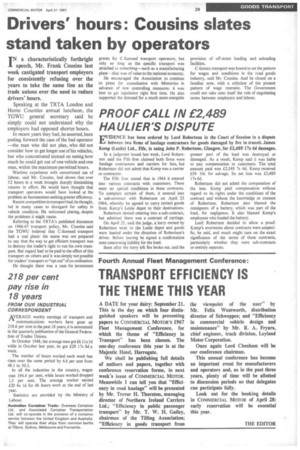Drivers' hours: Cousins slates stand taken by operators
Page 31

If you've noticed an error in this article please click here to report it so we can fix it.
ra characteristically forthright speech, Mr. Frank Cousins last week castigated transport employers for consistently refusing over the years to take the same line as the trade unions over the need to reduce drivers' hours.
Speaking at the TRTA London and Home Counties annual luncheon, the TGWU general secretary said he simply could not understandwhy the employers had opposed shorter hours.
In recent years they had, he asserted, been putting forward the case of the bad operator —the man who did not plan, who did not consider how to get longer use of his vehicles, but who concentrated instead on seeing how much he could get out of one vehicle and one man, within the maximum permitted hours.
Wartime experience with unrestricted use of labour, said Mr. Cousins, had shown that over 52 hours in a week brought sharply diminishing returns in effort. He would have thought that transport operators would have looked at the problem as businessmen seeking greater efficiency.
Recent competition in transport had, he thought, led in many cases to disregard for safety in vehicle condition. He welcomed plating, despite the problems it might cause.
Referring to the TRTA's published document on 1966-67 transport policy, Mr. Cousins said the TGWU believed that Clicensed transport had a real place: the union was not prepared to say that the way to get efficient transport was to destroy the trader's right to run his own transport. But regard had to be paid to the effect of this transport on others and it was simply not possible for traders' transport to "opt out" of co-ordination.
He thought there was a case for investment grants for C licensed transport operators, but only so long as the specific transport was attached to something—such as a manufacturing plant—that was of value to the national economy.
He encouraged the Association to continue to press for consultation with Ministries in advance of new controlling measures: it was best to get legislation right first time. He also supported the demand for a much more energetic pro vision of off-street loading and unloading facilities.
C-licence transport was bound to set the pattern for wages and conditions in the road goods industry, said Mr. Cousins. And he closed on a familiar note, with a criticism of the present pattern of wage restraint. The Government could not take unto itself the role of negotiating terms between employers and labour.




































































































































